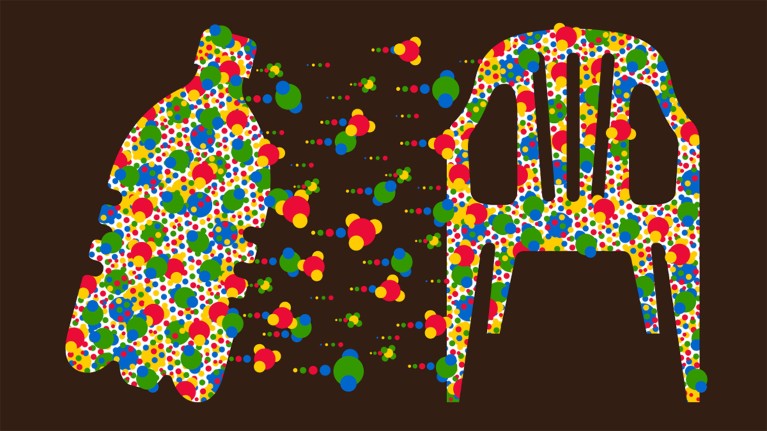- Sarah DeWeerdt is a science writer based in Seattle, Washington.
You can also search for this author in PubMed Google Scholar

There’s a soap dish for sale at a beauty products shop in São Paulo, Brazil. An off-white disc with a smooth, rounded shape like a river stone, it is just one of millions of plastic soap dishes on offer in shops around the world. But, although most plastics are made from petroleum, some of the plastic in this dish started out as methane generated by a water-treatment facility in California.
Access options
Access Nature and 54 other Nature Portfolio journals
Get Nature+, our best-value online-access subscription
cancel any time
Subscribe to this journal
Receive 51 print issues and online access
196,21 € per year
only 3,85 € per issue
Rent or buy this article
Prices vary by article type
Prices may be subject to local taxes which are calculated during checkout
Nature 611, S2-S5 (2022)
This article is part of Nature Outlook: The circular economy, an editorially independent supplement produced with the financial support of third parties. About this content.
References
- Zibunas, C., Meys, R., Kätelhön, A. & Bardow, A. Comput. Chem. Eng.162, 107798 (2022). ArticleGoogle Scholar
- Geyer, R., Jambeck, J. R. & Law, K. L. Sci. Adv.3, e1700782 (2017). ArticlePubMedGoogle Scholar
- Lange, J.-P. ACS Sustainable Chem. Eng.9, 15722–15738 (2021). ArticleGoogle Scholar
- Tiso, T. et al.Metab. Eng.71, 77–98 (2022). ArticlePubMedGoogle Scholar
- Klotz, M., Haupt, M. & Hellweg, S. Waste Manag. 141, 251–270 (2022). ArticlePubMedGoogle Scholar
- Wilson, D. C. & Velis, C. A. Waste Manag. Res.33, 1049–1051 (2015). ArticlePubMedGoogle Scholar
- Bardow, A. et al. Preprint at Research Square https://doi.org/10.21203/rs.3.rs-1788256/v1 (2022).
- Johansen, M. R., Christensen, T. B., Ramos, T. M. & Syberg, K. J.Environ. Manag.302, 113975 (2022). ArticleGoogle Scholar
- King, S. & Locock, K. E. S. J. Clean. Prod.364, 132503 (2022). ArticleGoogle Scholar
Related Articles
Subjects
- Sustainability
- Materials science
- Environmental sciences
- Organic chemistry
Latest on:
SustainabilityThe pharmaceutical industry must embrace synthetic alternatives to horseshoe-crab blood
Correspondence 10 SEP 24

Data on SDGs are riddled with gaps. Citizens can help
Comment 10 SEP 24

Waste management won’t solve the plastics problem — we need to cut consumption
News & Views 04 SEP 24
Materials science
Future optoelectronics unlocked by ‘doping’ strategy
News & Views 11 SEP 24

Two-dimensional-lattice-confined single-molecule-like aggregates
Article 11 SEP 24

Ultrahigh electromechanical response from competing ferroic orders
Article 11 SEP 24
Environmental sciences and the quest for exact dating with radiocarbon" />
and the quest for exact dating with radiocarbon" />
Extreme solar storms and the quest for exact dating with radiocarbon
Perspective 11 SEP 24

Wildfires are spreading fast in Canada — we must strengthen forests for the future
Comment 09 SEP 24

Simple steps could shrink US beef industry’s carbon hoofprint
Research Highlight 05 SEP 24
Jobs
PhD and MSc position at the Faculty of Biology in the Technion - Israel Institute of Technology
Join the Faculty of Biology at the Technion – Israel Institute of Technology The Technion, located in Haifa, Israel, is a world-renowned institutio. Israel (IL) Faculty of Biology, Technion
Call for Participation at Forum of Young Scientists Shenzhen University of Advanced Technology
Shenzhen University of Advanced Technology (SUAT) invites interested individuals to its Forum of Young Scientists. Shenzhen, Guangdong, China Shenzhen University of Advanced Technology
2024 Recruitment notice Shenzhen Institute of Synthetic Biology: Shenzhen, China
The wide-ranging expertise drawing from technical, engineering or science professions. Shenzhen,China Shenzhen Institute of Synthetic Biology
Chief Operating Officer
Salary: £425,000 per annumContract: PermanentClosing date: Sunday 22nd September Founded in 1936, Wellcome is a politically and financially independen England, London WellcomeTrust
Executive Director, Discovery
Salary: £400,000 per annumContract: PermanentClosing date: Sunday 22nd September Founded in 1936, Wellcome is a politically and financially independe London, England WellcomeTrust